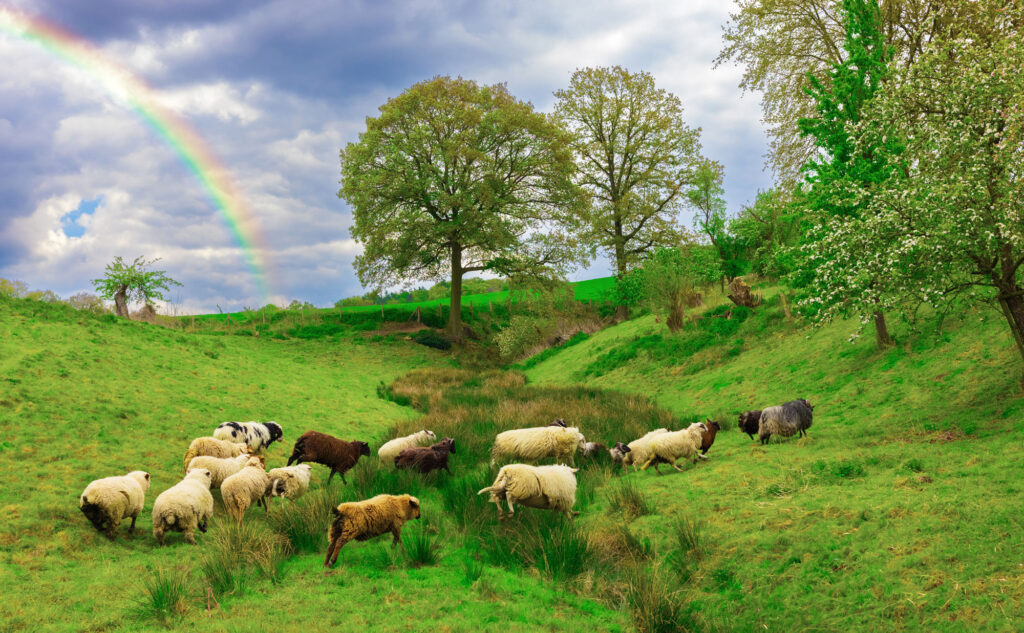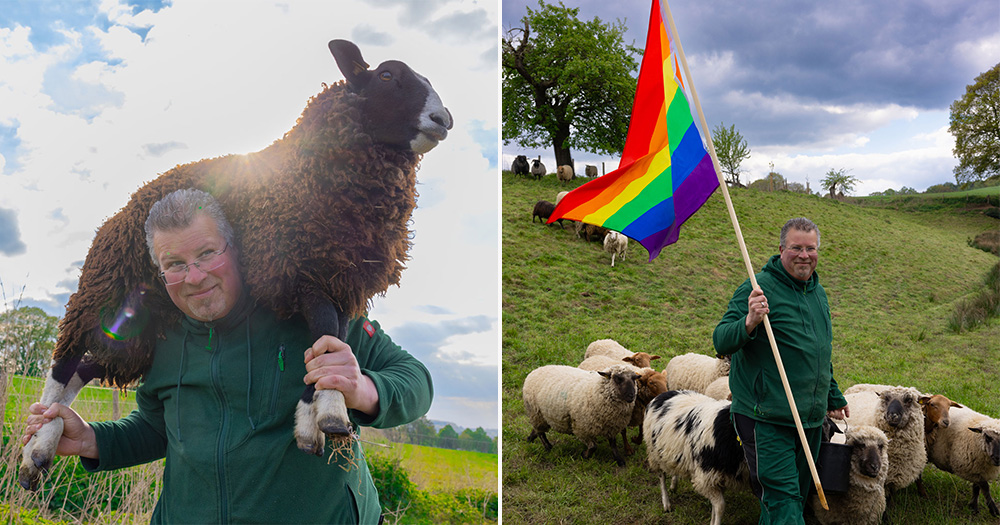These gay sheep are the stars of the hour. The flock of 21 rams on a farm in Löhne, North Rhine-Westphalia in Germany have risen to fame through a fashion brand called Rainbow Wool, which produces caps, patches and shoelaces from the wool of the fluffy new celebrities. What’s more, the profit goes entirely to LGBTQ+ causes.
Since the project launched, shepherd Michael Stücke’s phone won’t stand still. “In the last weeks, there hasn’t been a day on which I haven’t given an interview. The number of enquiries we’re receiving at the moment is bombastic”, the 51-year-old farmer says. A member of the Gayfarmer Network in Germany, Stücke is gay himself and lives on the farm with his husband.
The project developed from a conversation he had about homosexual behaviour in sheep with a friend who works for a PR and communications agency. According to studies, apparently about one in 12 sheep is gay.
“Sometimes rams jump at each other trying to mate or entirely reject the females and only show interest in the male conspecifics,” Stücke told GCN. “Our friend asked, ‘What’s happening to those sheep?’ I said they will be slaughtered for meat because they are not suitable for breeding.”
As Stücke explains, regulations dictate that there must be one ram per 50 ewes and that ram is expected to sire offspring. “If the ram is gay, he obviously doesn’t do that.” So, like many other male sheep, the gay rams end up at the slaughterhouse.
Stücke’s friend wondered if anything could be done to change this and if the rams’ wool could be used for something. It was then that the idea for Rainbow Wool was born, and the friend’s PR and communications agency bought 21 gay rams from breeders. In September 2023, the first rams moved to Stücke’s farm.
“When many people work together, bringing different perspectives and ideas with them, a project can go very far. I witnessed step by step how it all developed, and I am so happy that we have succeeded in making various good quality products from the wool and have succeeded in bringing the many different breeds together. Because every breed has its own wool quality, this makes the wool more difficult to process but we found a spinning mill that spins this wool,” Stücke shares about the process.
The results are the products available in Rainbow Wool’s online shop, for quite a high price, however. Do people really pay that much? “Yes”, says Stücke, “the products are in high demand. I learned very fast that this goes down really well with the younger generation. They find it cool to have shoelaces made from the wool of gay rams.”

The sheep farmer admits he didn’t expect the project to be as successful and big as it has become. The gay celebrity sheep and their fashion products have hit like a bomb and Stücke barely got any negative reactions to the project. Even famous German singer Bill Kaulitz from the internationally acclaimed band Tokio Hotel, himself bisexual, visited the farm.
Kaulitz promoted the initiative and its fashion products and adopted two rams. “It was very exciting for us to hear that a celebrity would be visiting us, but first I doubted that Bill would really come. But he did and he was a very nice and natural guy,” Stücke remembers.
He continues, saying: “What really delights me, is that so many people profit from the project, not just one person who came up with the idea.” The entire profit goes to The Federation Queer Diversity in Germany (LSVD+) which helps various LGBTQ+ causes. According to the Human Dignity Trust, 63 countries still criminalise LGBTQ+ activity, and LSVD+ supports international projects aiding people in these places.
Even the breeders seem to be happy about the arrangements, where slaughterers have been outbid to get the sheep. “I think knowing that their animals can continue to live here, made them be on board”, Stücke assumes. “But the sums paid for these rams are significantly above the usual slaughter prices.”
To stop breeders from claiming their rams are gay just to make a profit, Stücke shares how they recognise homosexual behaviour in the animals. “The jumping on each other isn’t the criterion but showing no interest in the ewes and refusing the mating act is a good sign. The flock we have here, they obviously show interest in each other.”
He adds: “We also talked to our vet about the topic, and I was surprised to hear what she said. Some of the information on gay sheep was still very new to me, maybe even a bit strange at first,” Stücke admits. “But quite a lot of studies exist on the topic.”
Could there be even more LGBTQ+ sheep, like lesbian, bi or trans sheep? While Stücke can’t answer that question for sure, he shares that with female sheep, it is harder to witness any clear homosexual behaviour. “But to be honest, so far I haven’t had the time yet to scrutinise that.”
Sieh dir diesen Beitrag auf Instagram an
What about the future of the project? While the agency had thought about bringing out a whole clothing collection, one sheep can only produce four kilograms of wool, and they are only sheared once a year. “With 21 rams, our possibilities are currently very limited,” the farmer explains.
“We shear the gay sheep separately from our own to gain their wool independently. If a few more gay rams appear and if everything can be marketed well, the project might be able to successfully grow and products be extended. We have plenty of ideas.”
The space on Stücke’s farm is there for the fluffy queer flock to take on more members. “That’s absolutely no problem”, Michael Stücke says, “we assume we can keep about 100 rams.”
Until then, people can support the project by adopting one of the rams. The sponsorship helps guarantee that the sheep can live a good life on the farm until they are old and die of age. This is possible from everywhere, so Irish people looking for a gay ‘godsheep’ to look after can sign up as well.
In Ireland, the Irish National Sheep and Goat Census reported a total of 3.72 million sheep living here in 2023, of which, one might assume, not all are straight. “I’d be surprised if there wouldn’t be any gay rams”, Stücke says laughing. “I could imagine a project like ours to be successful there, too.”
With Rainbow Wool’s campaign currently seeming to be the first of its kind across the world, farmer Michael Stücke certainly hopes to inspire other sheep farmers, also in Ireland, to start a similar scheme. “I just hope they don’t want to make profit entirely for themselves and do something good with the proceeds for society.”
© 2024 GCN (Gay Community News). All rights reserved.
Support GCN
GCN is a free, vital resource for Ireland’s LGBTQ+ community since 1988.
GCN is a trading name of National LGBT Federation CLG, a registered charity - Charity Number: 20034580.
GCN relies on the generous support of the community and allies to sustain the crucial work that we do. Producing GCN is costly, and, in an industry which has been hugely impacted by rising costs, we need your support to help sustain and grow this vital resource.
Supporting GCN for as little as €1.99 per month will help us continue our work as Ireland’s free, independent LGBTQ+ media.
